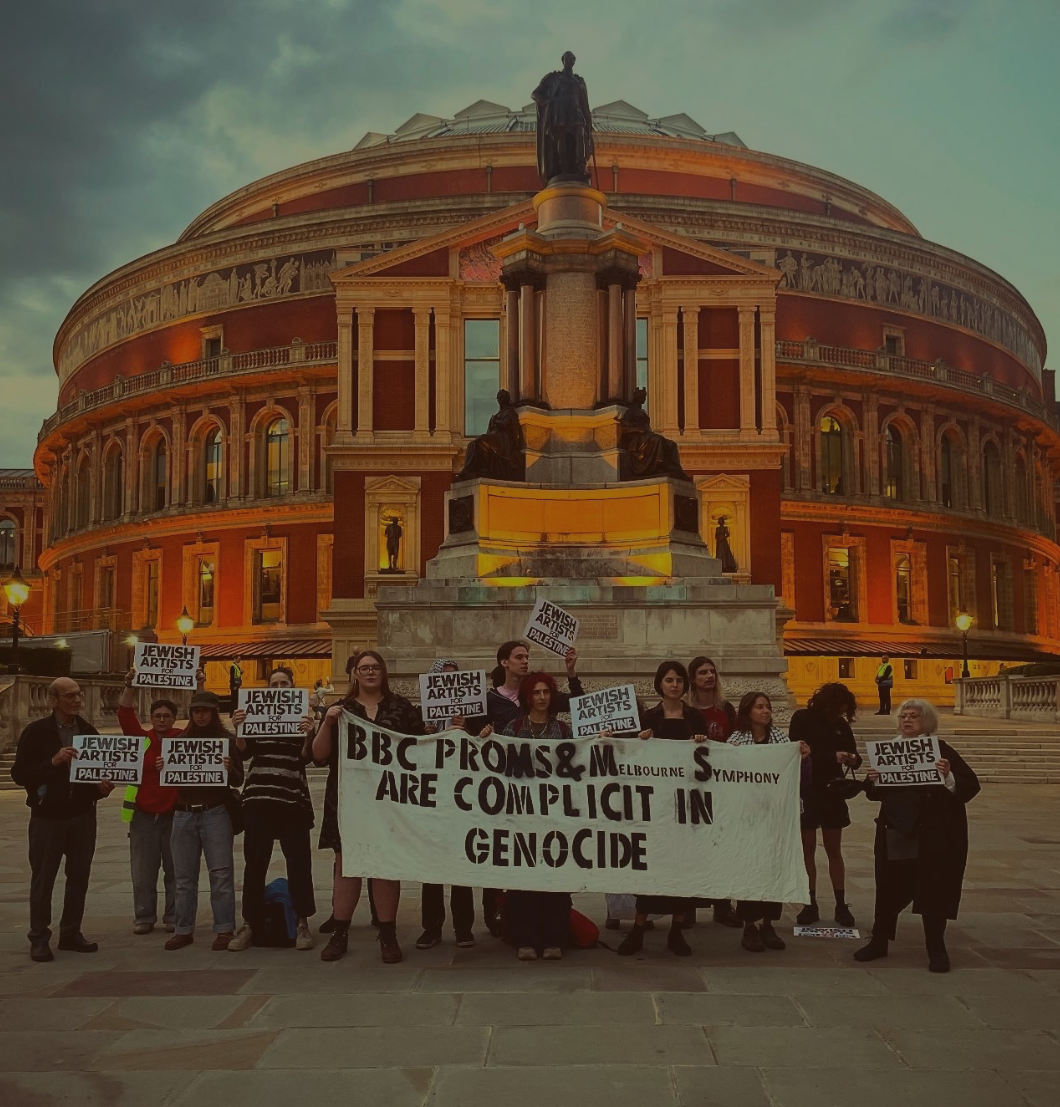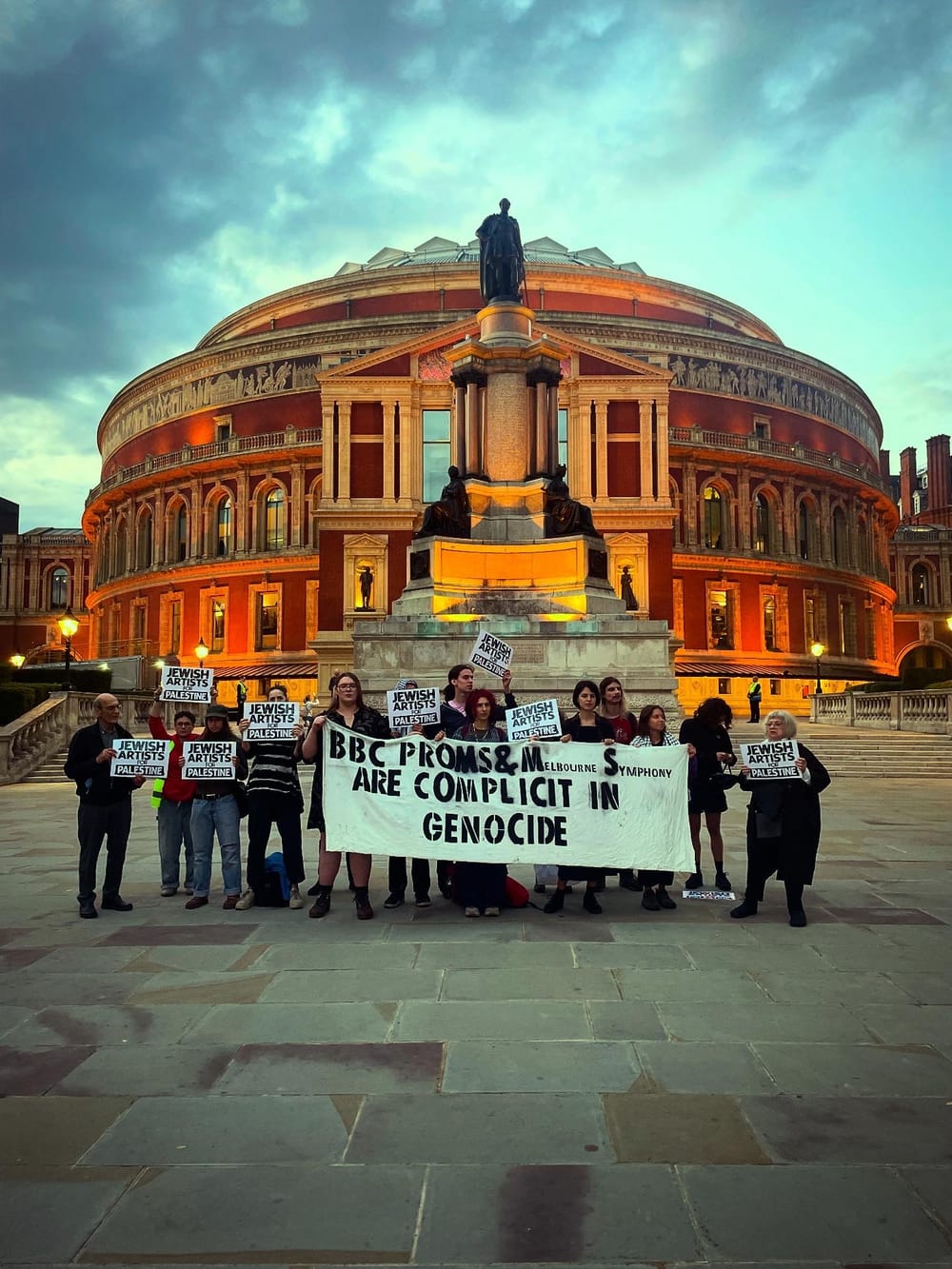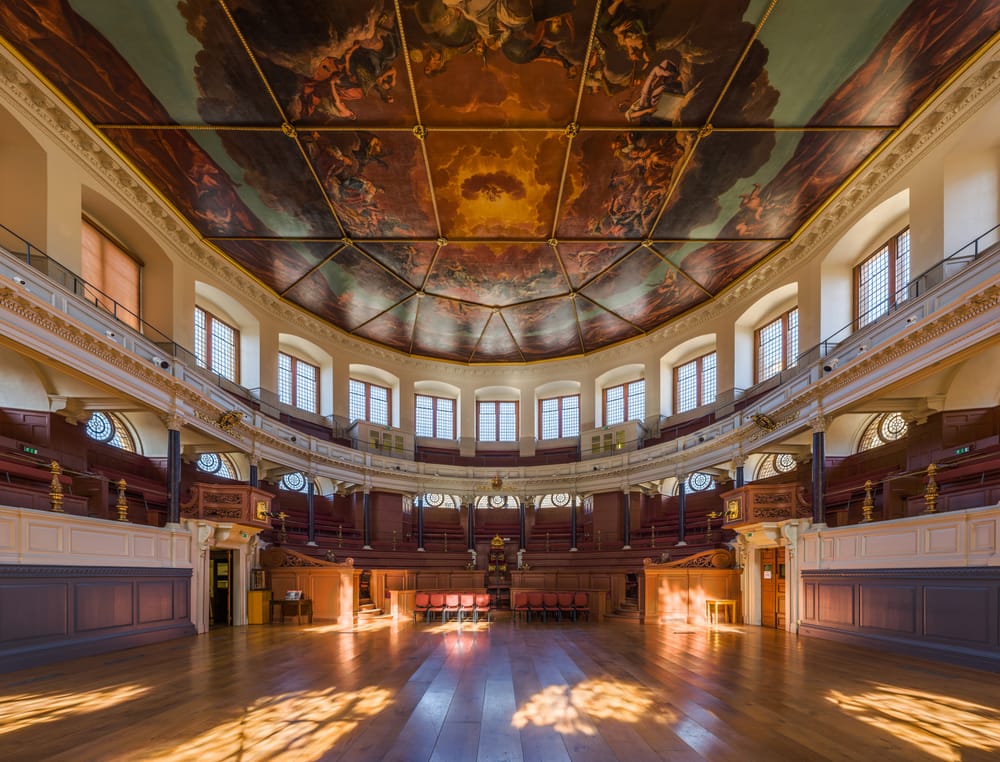Meet Holocausts: The anti-Zionist punk band resisting literally everything
‘I want the kids I meet to say “Oh! Maybe I don’t have to live like a patriotic militant freak!”’

It’s two days after the Passover Seder, and in the basement of Jerusalem’s Pergamon club, a group of young punks are standing in a circle singing Israel’s national anthem, Hatikvah.
“Hey! Hey!” Roy Elani is not happy. “Yo! Shut the fuck up!”
He marches onto the stage and grabs the microphone. “We don’t do that here!” He glares at the punks, who look shifty. “If you want to sing the national anthem or wave a fucking flag you can get the fuck out!”
The kids laugh, but they’re listening. They look up to Roy. He’s in about 12 punk bands and counting, two of which are playing tonight: Alien Fucker and Holocausts.
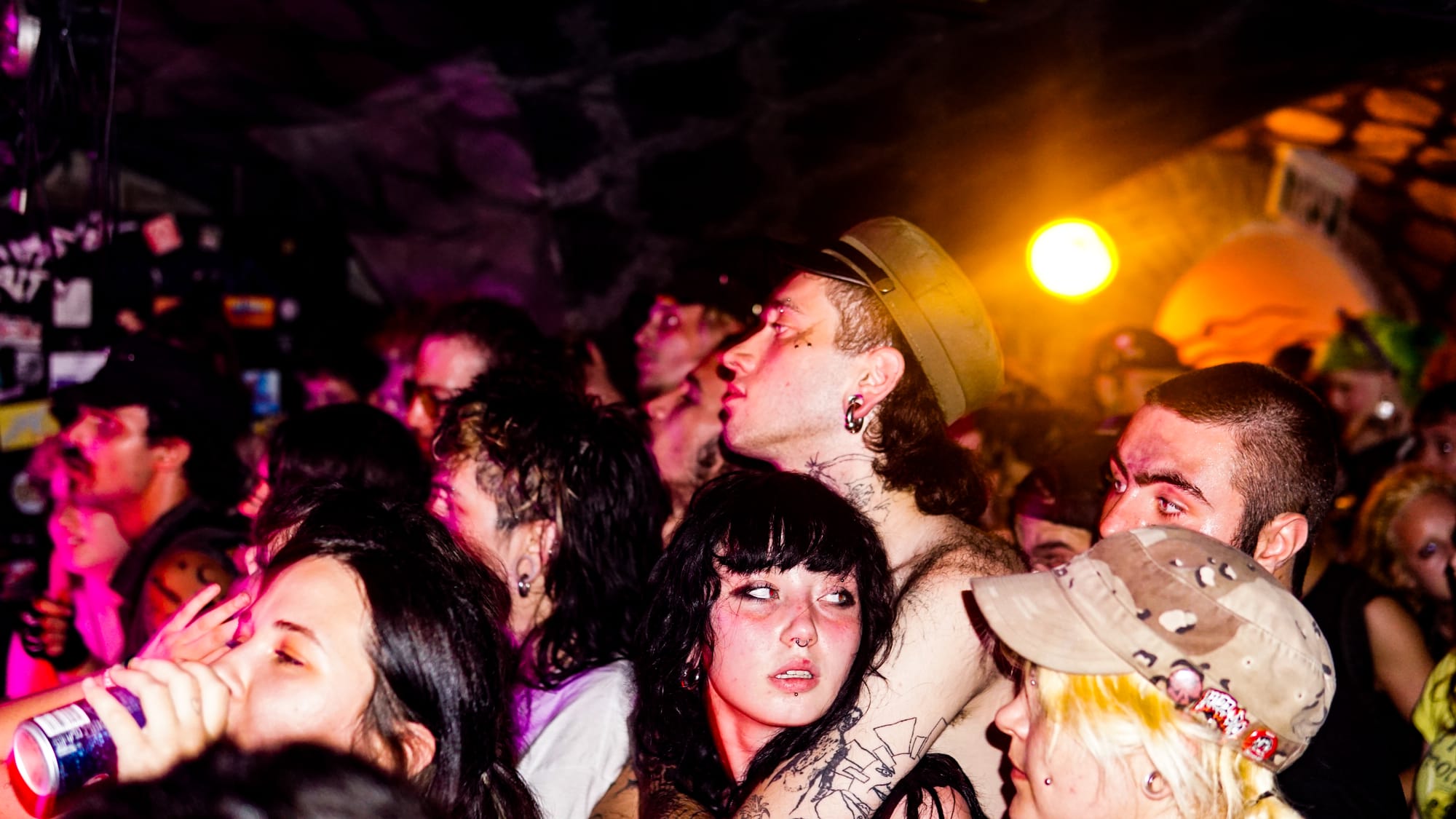
He’s only 27, but Roy is the backbone of this community, and pours every spare second and shekel into it. When he isn’t working three jobs he’s hand-drawing zines, writing music, or throwing events. Last week he set up a stall at Tel Aviv’s Levinsky market, invited all his friends, spent the day serving up food and then donated the proceeds to the mutual aid collective Culture of Solidarity.
Tonight, about 150 punks, metal heads, freaks and geeks have descended on Pergamon. It’s a small, sweaty, dingy club, which hosts Jerusalem deviants: noise artists, kink events, drum’n’bass nights – and now Alien Fucker, who describe their music as “porn grind.” As Israel’s most conservative communities walk overhead, three shirtless men wearing knitted balaclavas thrash around below, screaming about alien orgies, sperm lords and nuclear cum bombs.
The sound guy stands with one leg against the wall and one against a railing, trying to stop the kids from moshing onto his equipment. A conveyor belt of crowd surfers circulates overhead, and every five minutes someone rushes into the room with a giant sparkler, holding it up to the very low ceiling, which is covered in fabric and loose wires. No one is concerned. Everyone seems delighted.
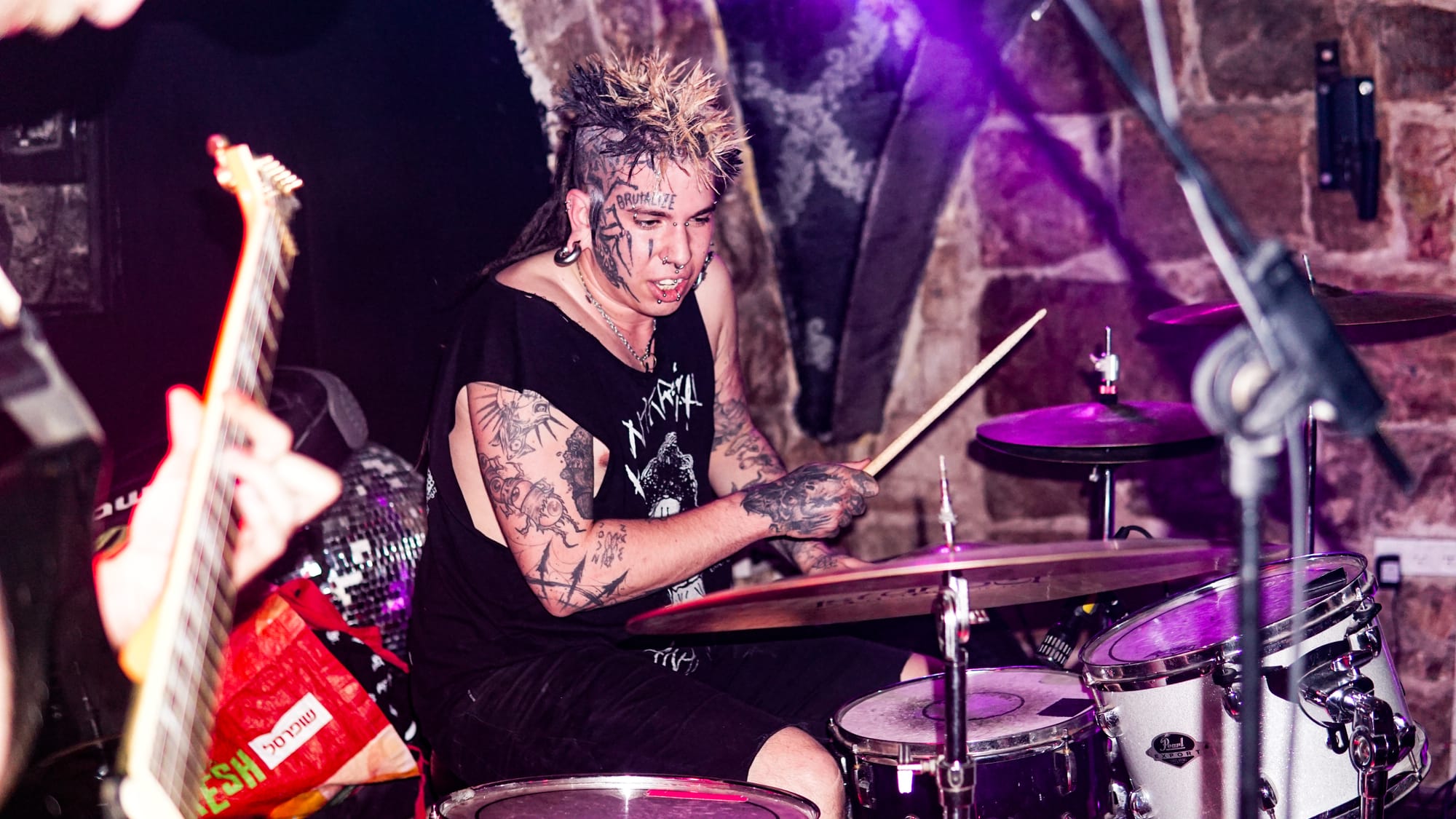
When Holocausts come on stage, Roy takes a second to tell the crowd to take care of one another – and to rethink joining the army. He tells them it isn’t normal to learn how to use a machine gun at the age of 18, urges them to reconsider their mandatory conscription, and then launches into a fast, furious thrash metal song. The drummer, whose face is mostly tattoo, seems to acquire an extra pair of arms; the bassist, dripping with sweat, disposes of his shirt within seconds.
After the show, the kids sit outside in huddles, leaning all their weight on one another, toking cigarettes and swigging vodka. A young fan tells me how Roy’s speeches have led her to re-evaluate her future.
“Before I started listening to punk, I really wanted to join the army,” she says. “But going to these concerts changed my mind. Roy talks about how it’s not normal to give little kids weapons and let them die.” Her friend nods in agreement.
The fact they’re even thinking about this is radical. Refusing military service can lead to a prison sentence and a permanent mark against their names in a society that venerates the army. They can’t be older than 15, and if Roy didn’t tell them this stuff, no one would.
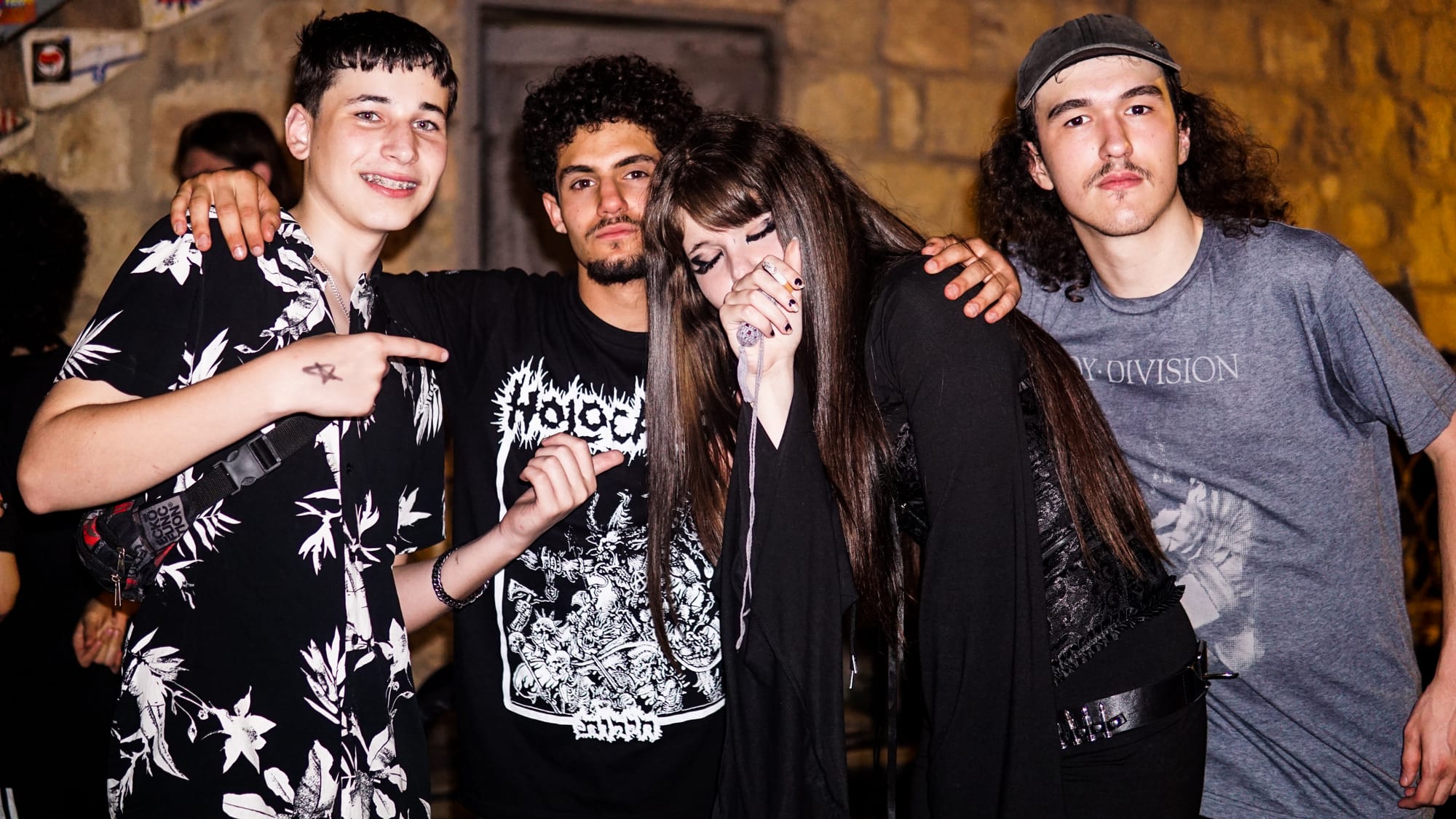
‘Punks believe in liberation for everyone’
The last punk house in Tel Aviv looks normal enough until you walk up some stairs and find the sea of beer cans and vodka bottles piled up in a hammock next to the door. Inside, a woman with pink hair and piercings sits on a near-collapsed sofa next to a tattooed man with a mohawk who’s eating a plate of noodles.
Every inch of wall is plastered with paraphernalia. Posters, band merch, parking tickets, comic strips, stickers, stamps, stop signs. This lot cannot walk two metres without looting something or other, and it makes for a unique interior concept. Ideal Home magazine might call it psycho-deco – but that’s not to say they aren’t house-proud. The place is clearly loved, albeit held together by thoughts and prayers rather than any kind of reliable structure.
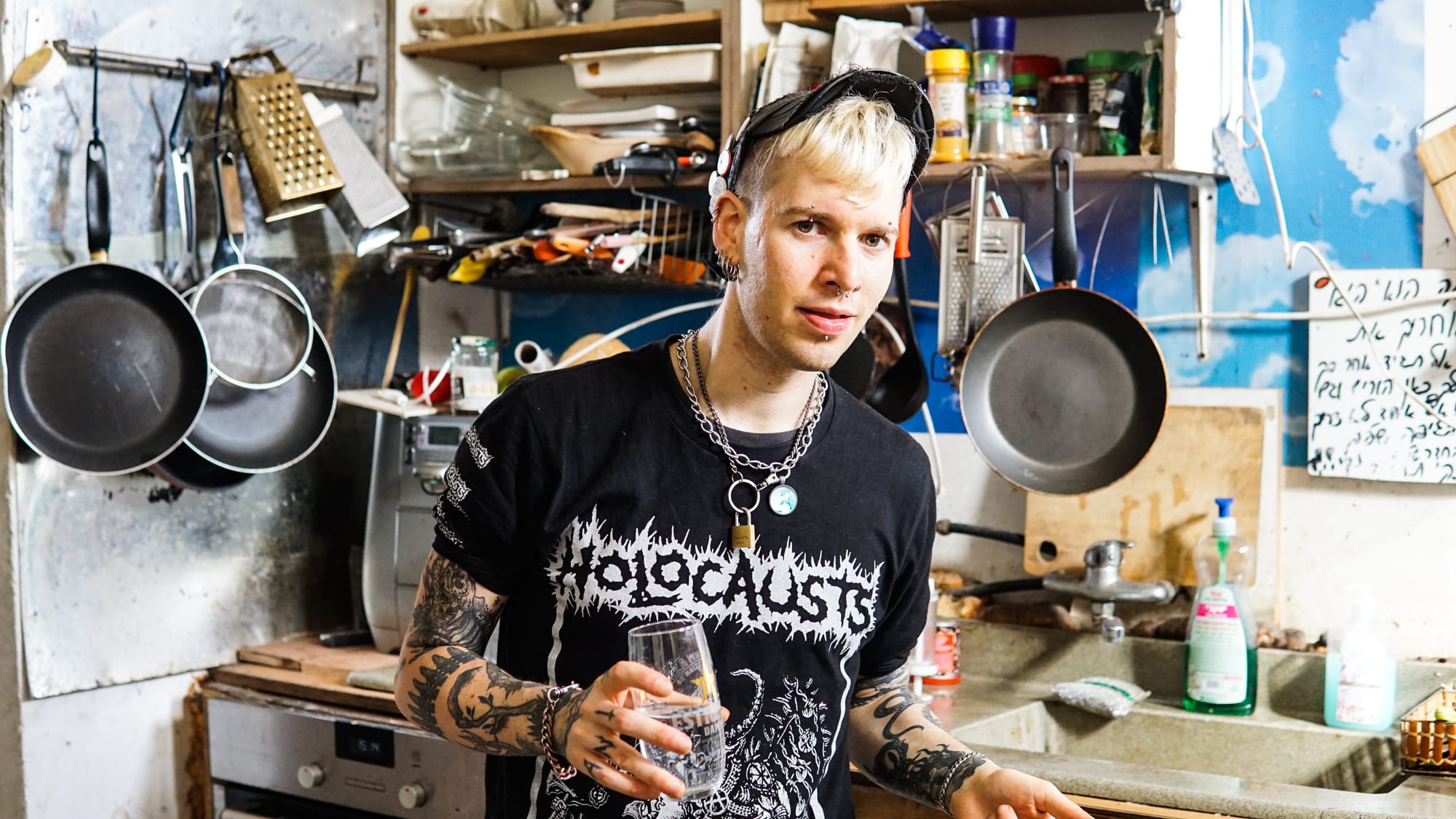
“Would you like a coffee?” Roy asks. “We love coffee. Sometimes we drink it for days without eating anything. We have loads of types. Look!” He points to a coffee machine on the kitchen counter which looks almost new. “We found it on the street in the Old North,” referring to one of the city’s more upscale neighbourhoods. “It works great!”
Roy has lived here for eight years, with a rotating lineup of visitors and flatmates. There are five official residents, usually about three or four unofficial ones, and one person lives in a van outside. I can hear the crash and pummel of band practice behind a closed door as Roy leads me to his room, which is up a precarious set of stairs. “Don’t worry,” he says. “Only two people have fallen down, and they were absolutely wasted.”
Roy’s room is a continuation of the decor downstairs, with every spare surface covered with stuff. “I have everything I could possibly need in here,” he says proudly. “Tuna, soy milk…” his voice trails off as if he’s run out of ideas, uninspired by the dildo, globe, toy beaver, tire, or the stolen street sign.
He takes a seat among a pile of clothes on his leopard print sofas and tells me how he grew up in a conservative religious family in the suburb of Or Yehuda. “When I was a child, I knew I was different,” he explains. “Everything was a fight. I was anti-everything. In school, I had so much imagination, I was always running away with myself to places. I used to go to synagogue, but when I was 13 I told my mum I don’t believe in God. Like, at all."
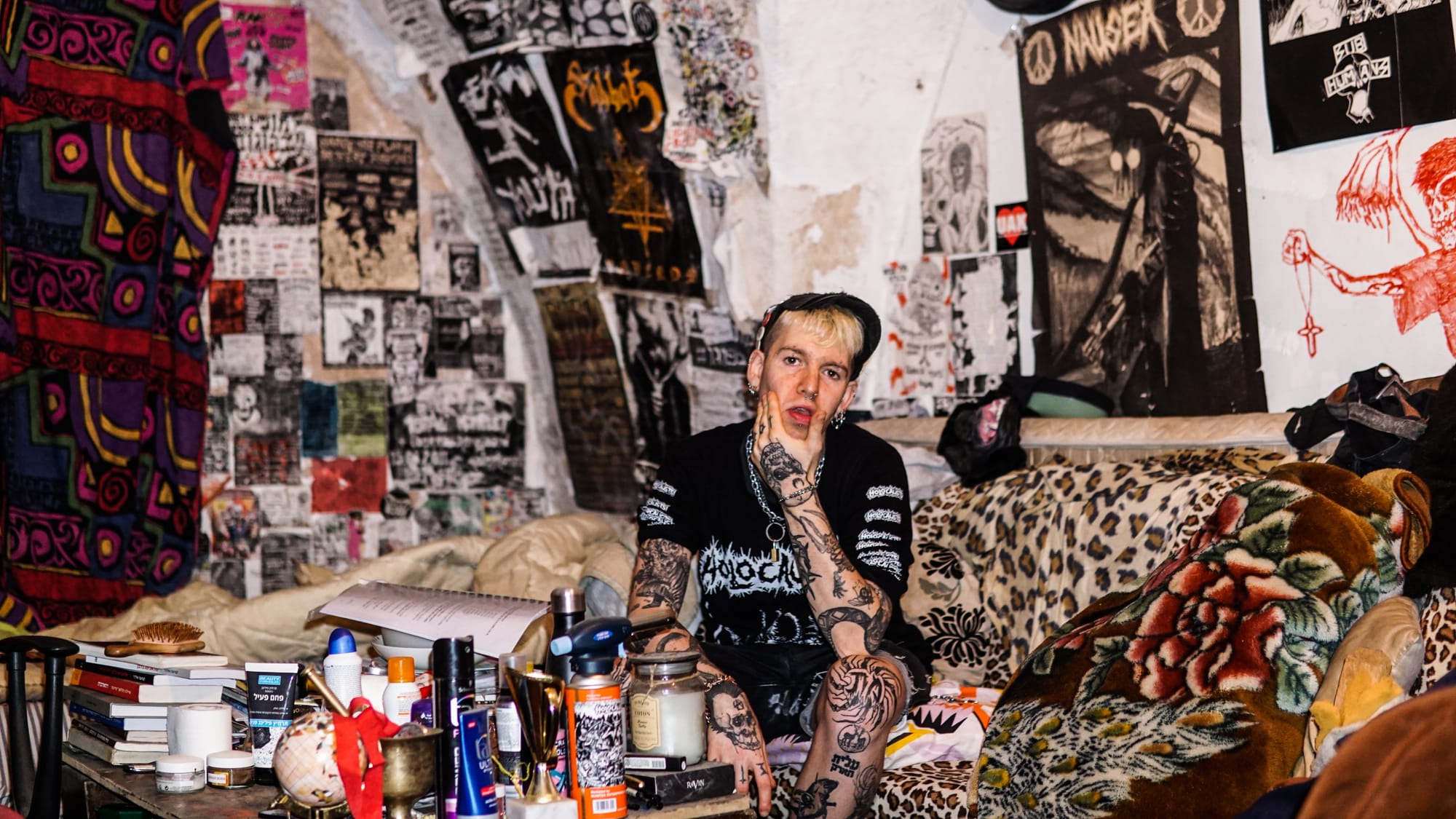
When Roy discovered punk music in his teens, he found his purpose and his place, and devoted his life to it. Punk is his friends, family, hobby, work, politics and values. He’s tattooed up to his eyeballs, cannot sit still and speaks at a million miles per hour, but his heart is clearly as big as the sun.
“Punk is about fighting for your liberation,” he says. “It needs to start with yourself, with your close community. Maybe I’ll die in two or three years, I don’t care. I want to leave the world a little bit more beautiful, even if it’s just for my community.
“Some people come to punk because they like the fashion or style, or want some kind of hierarchy, which is the opposite of what I believe in,” Roy continues. “Punks believe in liberation for everyone, not just for us and our friends. And when you take freedom from other people, it’s wrong.”
‘The war is the best way to divide people and brainwash them’
Roy says he hates the word “scene”, because it suggests it’ll come to an end sometime, like in a movie. “I believe in this way of life,” he says. “I live and breathe it. It’s not just a statement. Anarchy is not believing in any system. I live in a system, I live in a country, but I don’t believe in it. I don’t believe in the borders, I don’t believe it when people tell me who is my enemy.”
For that reason, Roy is highly sceptical of the prevailing narrative in Israeli society surrounding the current war on Gaza. “All the religious extremists in the government are warmongers; they benefit politically, religiously, economically out of this fucking shit,” he tells me, visibly agitated. “From day one they tell you it’s a war of survival, and you need to be paranoid. They say we’re surrounded by Arabs that only want to kill us. But you need to know that a lot of our biggest enemies are here, on the inside. And it will never stop if we don’t stop it first from this side.
“They want this to happen because it’s the fucking best way to divide people, brainwash them, make them patriotic, militant, religious,” he continues. “And you know where I learned all this? From the fucking Jewish holocaust!”
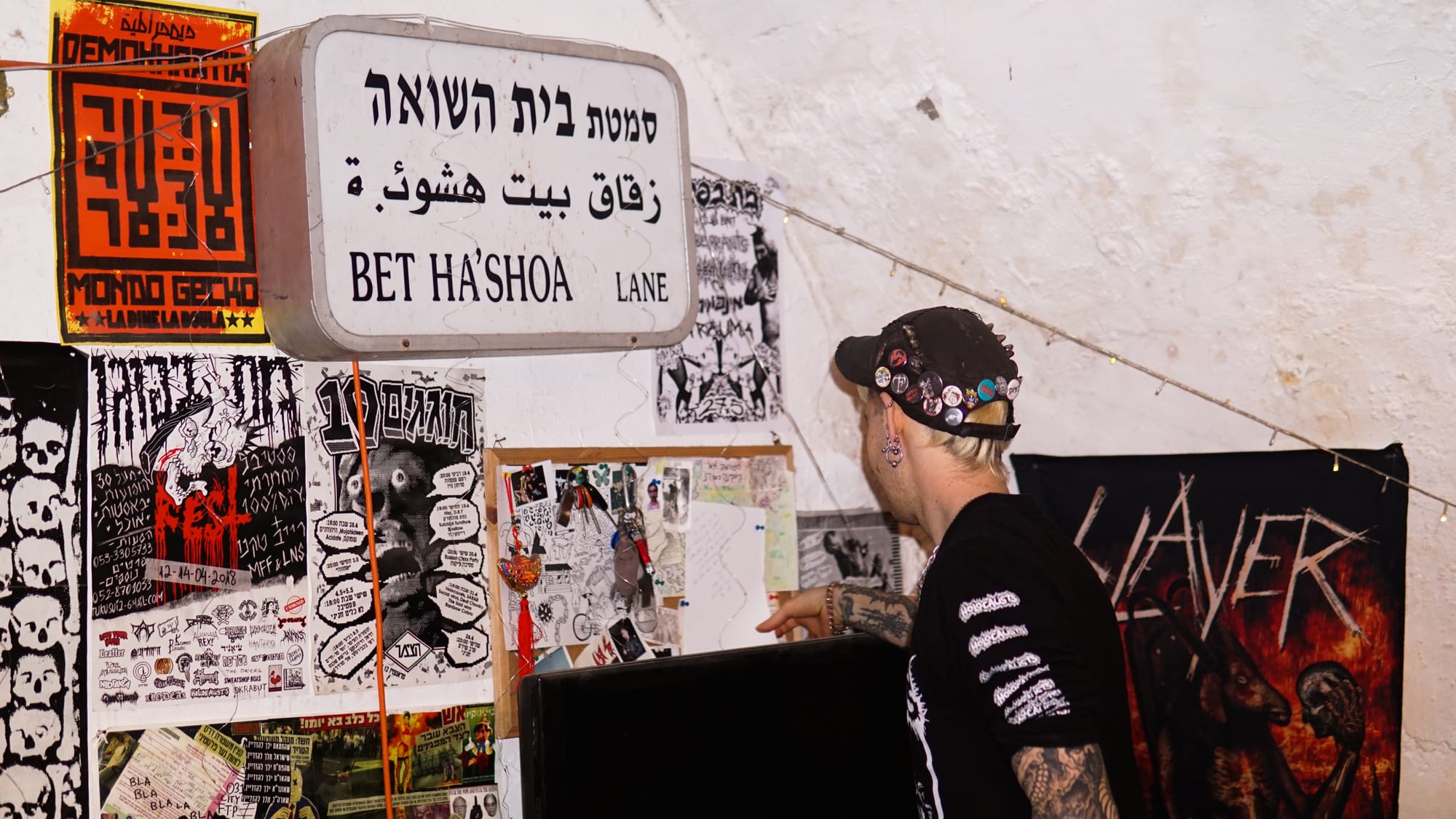
Roy hands me a zine he made for his band Holocausts. The first page states that the name is not a provocation nor a joke, and it’s not merely a reference to the Shoah.
“We believe that many holocausts have happened, are still occurring and will happen in the future,” it reads. “We strongly believe that trying to sweep it under the carpet and avoid using this term is equal to running away from the problem instead of trying to fix it, and our goal is that people will learn from past mistakes and stop hating and fighting people from other countries/races/colours because the system has taught them to do so.”
Roy and his friends regularly hand-draw, write and print scores of these zines, and give them out to kids at shows. “The Holocaust was the greatest class in all of history to learn how not to be racist, how not to dehumanise people, how not to make a genocide, how not to be a fascist,” he says.
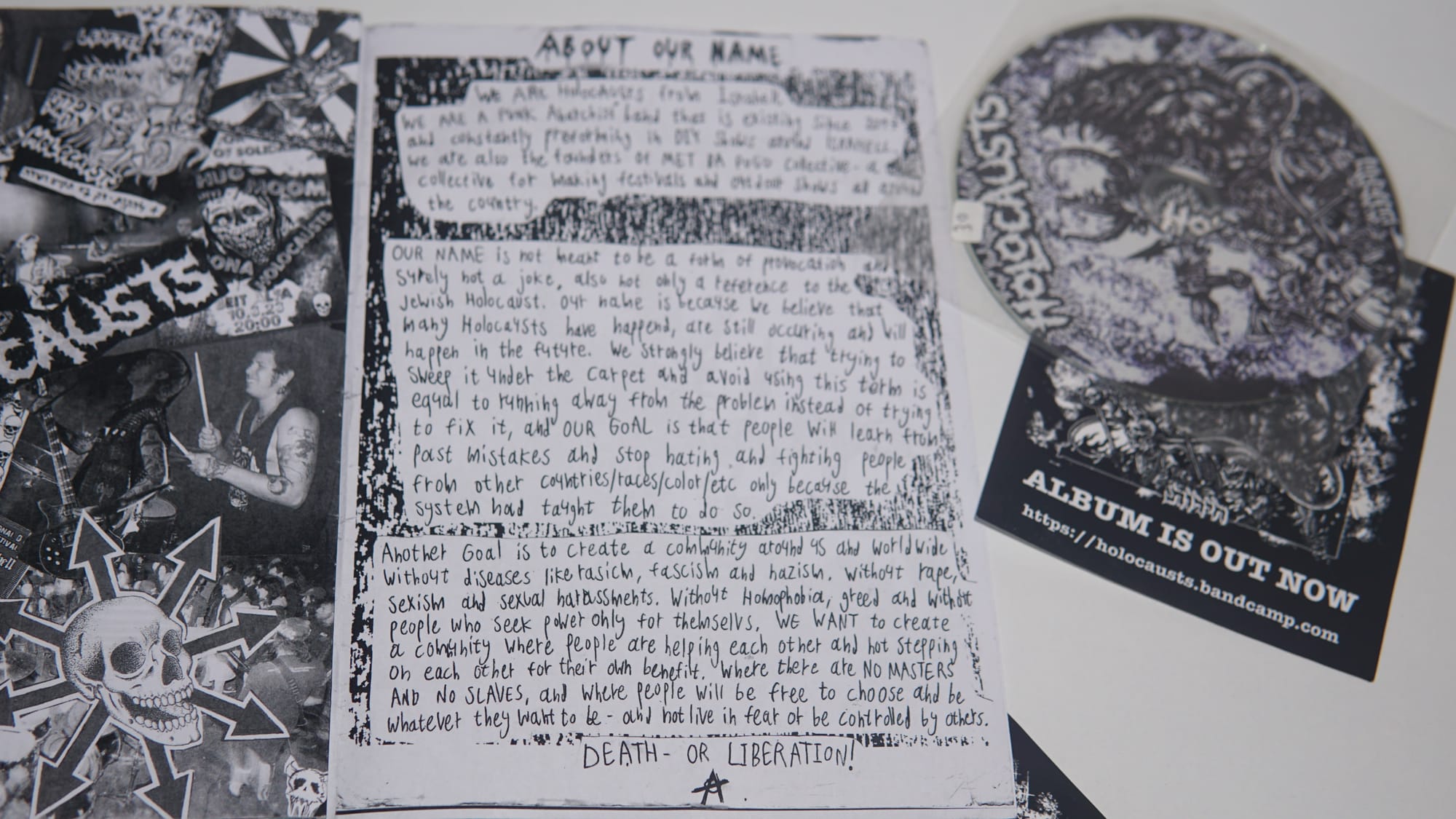
Roy uses his shows as an opportunity to encourage young people to think independently, and reject the systems they’re thrown into – just like he did as a teenager. “When I was 18, I only thought about drinking alcohol and taking drugs and acting like a banana,” he says. “I didn’t think about taking a gun and shooting somebody.”
These days, Roy can’t walk down the street without someone recognising him. He’s been in two seasons of Israel’s Come Dine With Me, and now he’s a local celebrity. “If we go outside now, everyone will say something to me,” he says. “It makes me so annoyed, it’s been like this for half a year. Now, when people come up to me, I say ‘No, I’m not Roy. I look similar, but I’m not him.’”
Roy takes a sip of water. “I hate it,” he says. “But I did it to make a point in this conservative fucking place. I wanted little kids to see me and say ‘Oh! There are people like this! Maybe I don’t have to live like a fucking idiot patriotic militant freak! Maybe I can live the way I like!’”
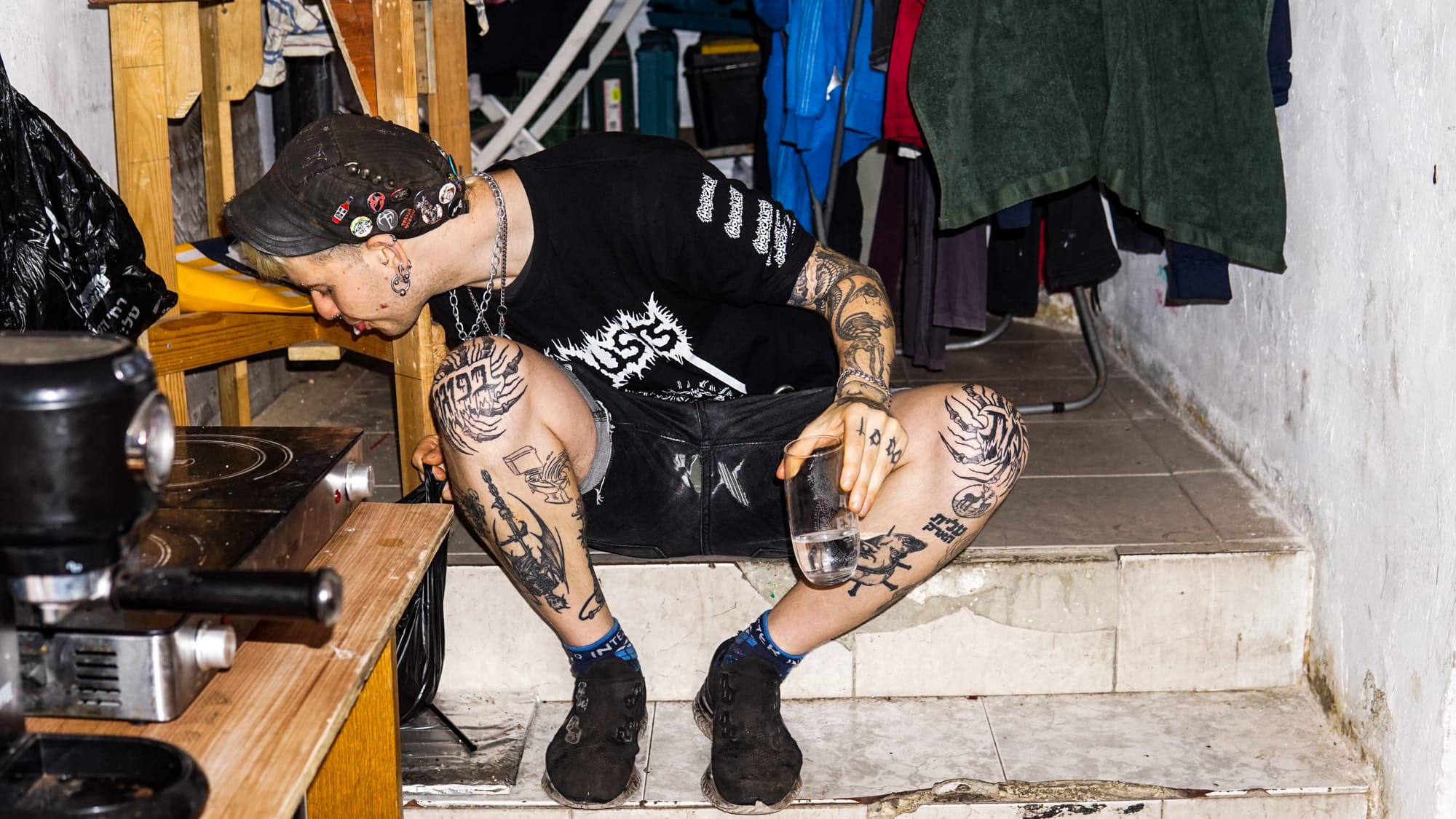
An anarchist oasis
Israel’s punk scene and the radical left used to be heavily intertwined. But as Israeli society has shifted ever further to the right over the years, the punks became more nihilist, opting instead to create their own utopian community instead of trying to change the political landscape.
As a result, the scene is isolated and vibrant, an anarchist oasis within a highly militarised and deeply patriotic society. There’s multiple punk events across Israel every week, with the scene most active in Tel Aviv thanks to the Yiddish library, Zimmer, Levontin 7 and Bet Alpha. But Jerusalem’s Pergamon and Haifa’s Rabbit Hole also host regular shows and cultivate thriving communities.
Israel’s punk community is in a unique position. It doesn’t suffer from cultural boycotts in the same way as the country’s pop, rock and electronic music scenes, because punk is inherently anti-government anyway. “A lot of punk bands will come here,” Roy explains. “They reject what Israel as a country does, but they see that it is not just a country. People live here, there are citizens. Punk is about people first. Even if they don’t agree with what the country does, they will come and say: ‘Your country is fucked up!’”
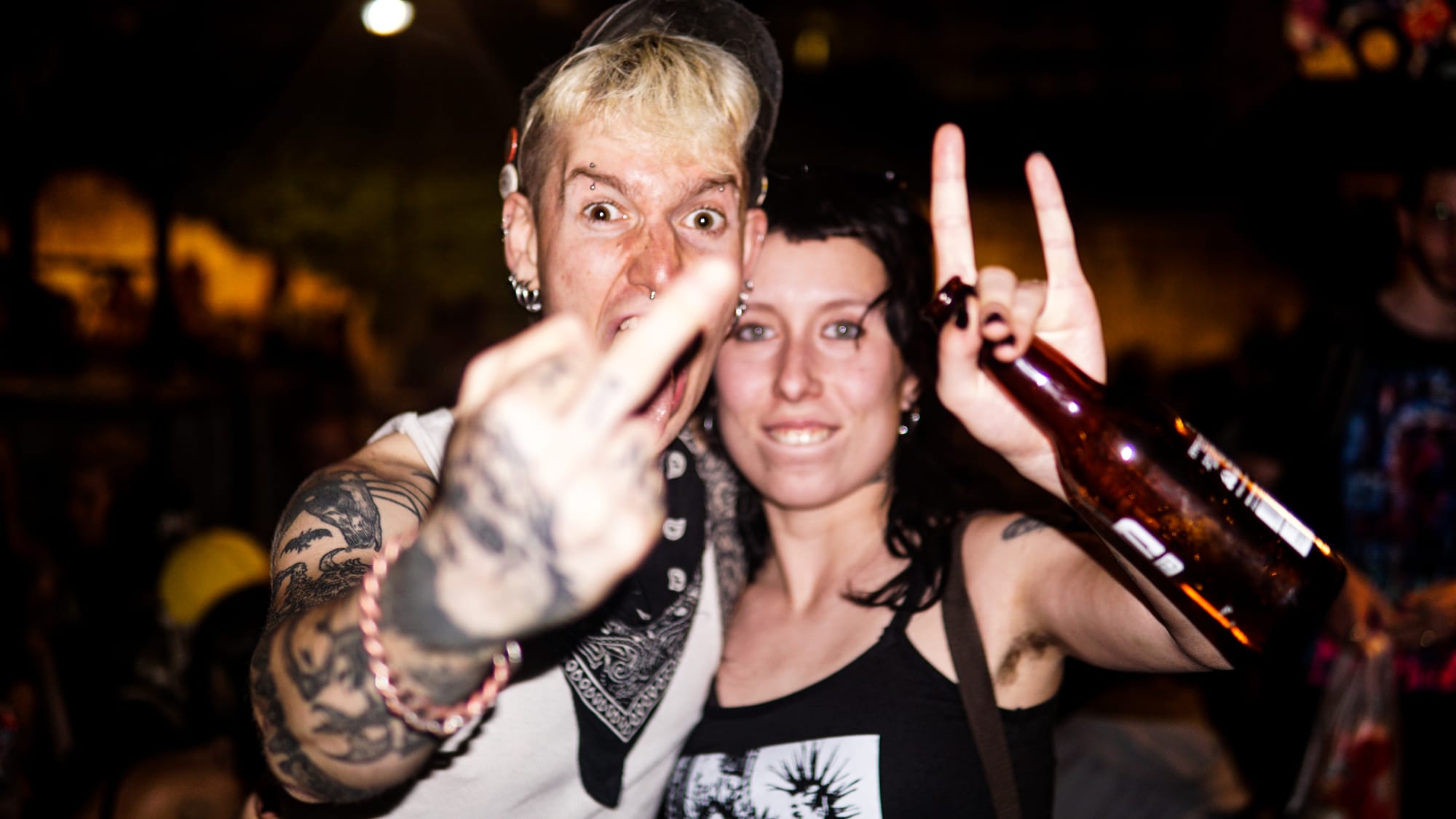
This year, Alien Fucker turns 10, and the band will tour Hungary, the Czech Republic, Poland and Germany. “Playing the show is the least important part,” Roy says. “We don’t want to come and play and be cool. It’s about making a point, talking to people, meeting people, making a party with other people, talking about stuff that’s hard to speak about.”
Roy says these shows are a sanctuary, a place where his community can connect on their own terms. “It’s the place for us to shelter from the outside world – away from hierarchy, wars, pain and loneliness.” ▼
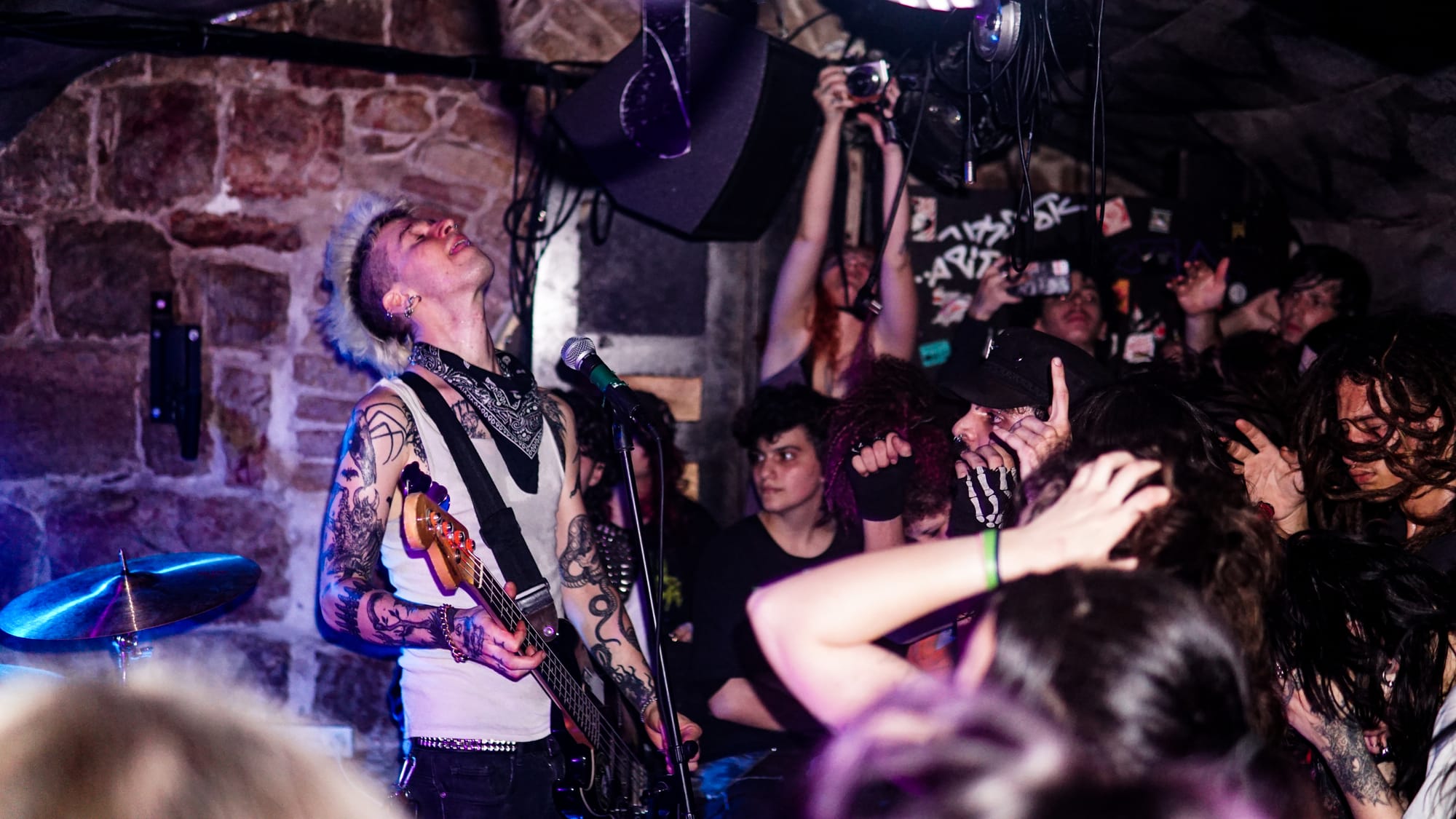
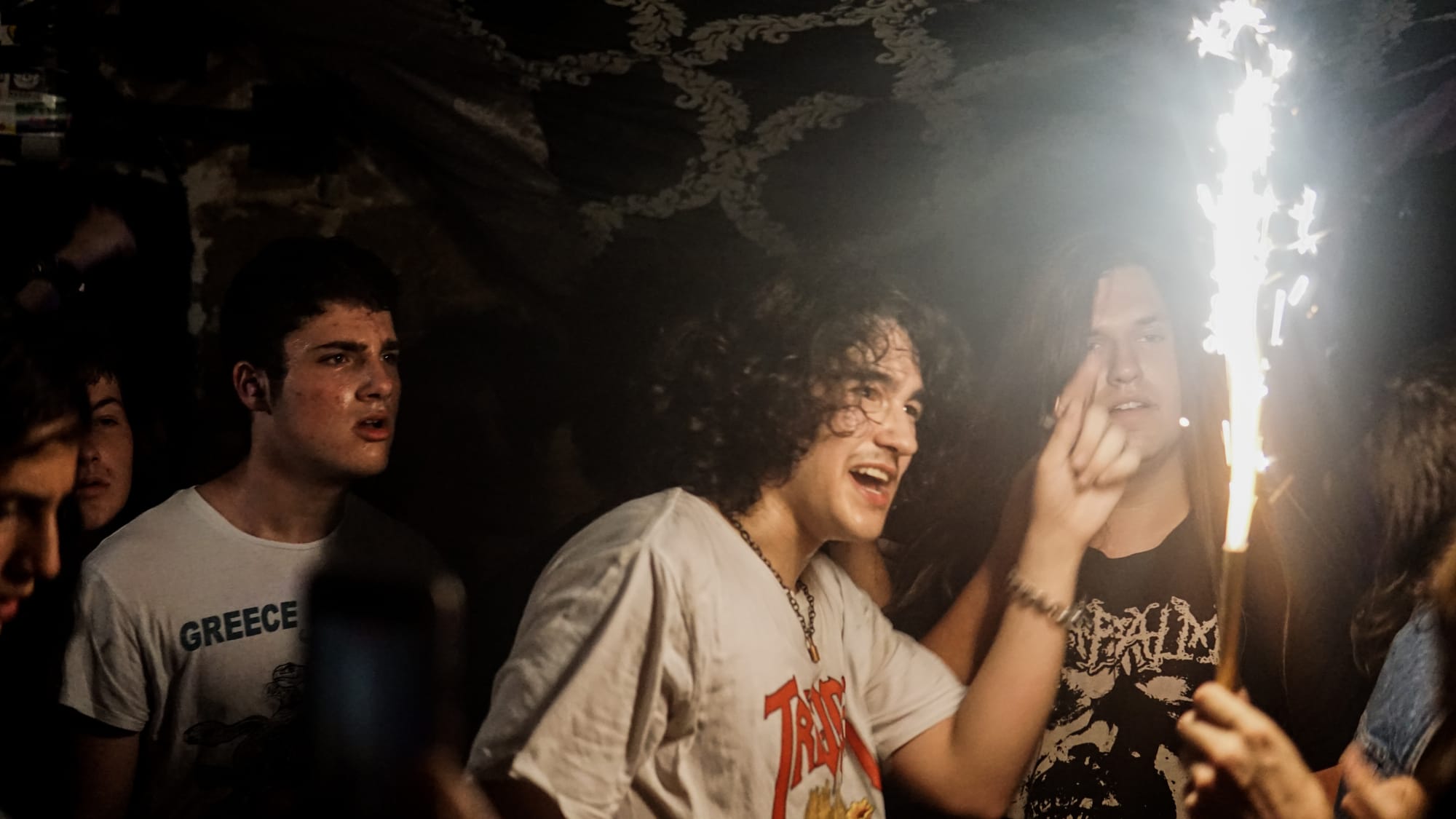
Alice Austin is a journalist covering global subculture, club culture and grassroots activism.
There’s no corporation or big advertisers behind Vashti – we're a workers' cooperative and rely on small donations to keep running. Support our journalism to help break the consensus.
To donate once, click here. To donate monthly, click here.
Author

Alice Austin is a freelance journalist covering culture, subculture, and the intersection of politics and music.
Sign up for The Pickle and New, From Vashti.
Stay up to date with Vashti.
